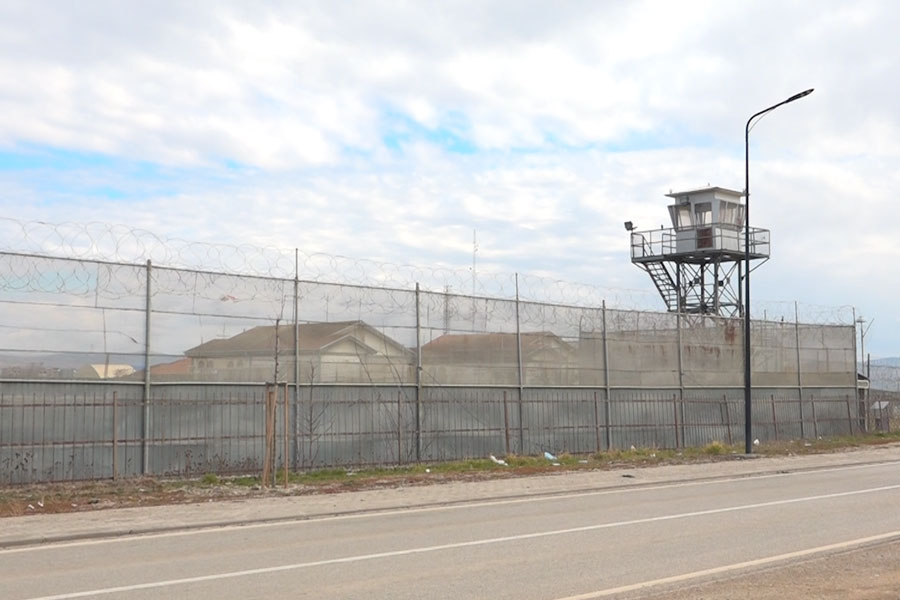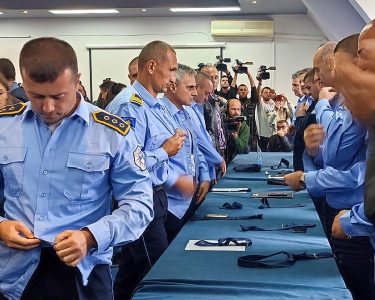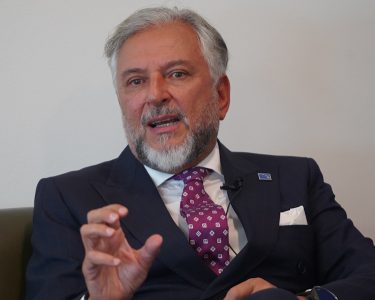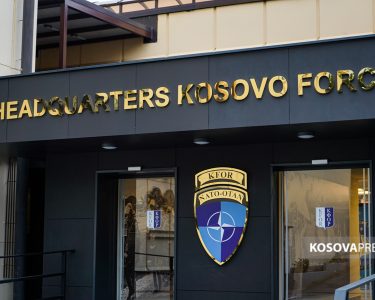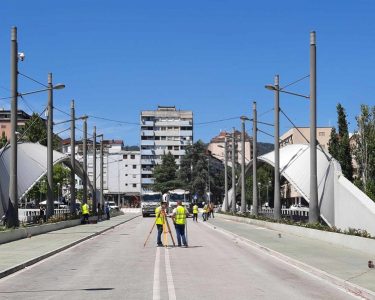She starts the day with work in the bakery, continues in tailoring and then in hairdressing, but also finds time to follow other trainings. This is a woman deprived of her freedom who has been living in the correctional center in Lipjan for six years now.
We have decided to call her “Bee” because she does not hesitate to do any job that is offered to her and this is how she feels good and it seems like the time goes by faster.
“At 07:00 in the morning we go to the bakery to work, there are four of us who work from 07:00 to 12:00, from 12:00 to 13:00 we rest in the pavilion, then we come here until 16:00, we also have other activities, other courses… We also ut hair. .. These jobs are done willingly and we spend a lot of time doing these jobs, I have also worked as a hairstylist outside the prison”, she said.
“Bee” says that while she works, she feels calmer and less stressed.

What she is learning here, she hopes to use when she is free, and she says that she intends to continue her profession as a hairdresser, but why not do some other job for which she has been trained.
“To continue my profession as a hairdresser, we have also learned some things here, we have attended many courses, we have learned tailoring, filigree courses, we have been certified, we have completed computer course, bakery and kitchen courses, these courses are very good for us because in the future, maybe you see yourself somewhere else, maybe you were in the wrong profession, now you see that something else is better for you, so the courses are very good… It is very important because with work, you do something good for someone, but we also spend our time here, and when you work you are always calmer and less stressed”, she said.
Together with three other women there, until now the “Bee” has made about 1300 sheets and pillowcases for all correctional institutions.
During the pandemic, they sewed 22,000 masks, which were not only for correctional institutions, but also for police stations.
Also, they made 207 bags for carrying canteen items.
In addition to the “Bee”, there are currently 35 other women in the Correctional Center in Lipjan. Of them, 14 are convicted, whereas 22 are in detention.
They have been living in the correctional institution for years and are engaged in work in order to pass the time better, as well as to increase the possibility of employment after the end of their sentence.
Four of them are employed in the bakery, which was a donation from EULEX in 2021, and there they prepare food for the three correctional institutions.

“Early in the morning we wake up, tidy up the rooms and go out to work. We work in the bakery; we work with friends… This makes me feel good, I don’t feel the boredom of prison, even though something unfortunate happened to us and now we are here, working makes me feel better… Now we are also taking the course to become a chef… We started working in the bakery a year ago, while in the kitchen, I’ve been working I arrived, it has been four years now”, she said.
Whereas in the kitchen, a total of 8 prisoners work in two shifts, who also help with cleaning.
In addition, in this correctional center, filigree training was also conducted, where five of the women were certified.
Whereas the training for informatics and technology has been completed by five prisoners in four modules.
After the technology training, one of the prisoners came up with a project that she intends to carry out during her stay inside.

“I already have a project, I have an idea, since we are in the time of digitization and everything nowadays is digital, I thought of sharing a part of my life, of my history, and share it with other women, to stand in solidarity with others, to tell a part of my story and to tell other women that you are not the only ones, there are other women and I want to give courage to women to continue forward and regardless of what happens in life, you must not give up”, she said.
The tailoring instructor, Hasime Krasniqi, talks about the prisoners’ interest in various trainings and activities.
Krasniqi: Women in the correctional center are interested to work
“There are interested women who both work and are engaged very well, some of them actually work outside the prison now, after serving the sentence, some of them are working. This is a profession that never leaves you without work or without money. But they work well and want to learn new things”, said Krasniqi.

For all the courses they follow, the prisoners in Lipjan receive certificates which they hope will help them when they’ll leave the prison, so that they can find themselves in one of the profiles. They are certified by professional training centers and those certificates do not indicate the place where the training was attended.
Whereas, convicts who have not completed secondary education, have the opportunity to continue it within the correctional institution, and on the diplomas they receive, it is written that the education was completed in the secondary school of the city where the correctional institution is located.
The Deputy Director of the Correctional Center for women in Lipjan, Dritan Bajramaj, says that they intend to increase the range of professions, but currently they do not have enough space for this.
“In the framework of serving the sentence, i.e., in the correctional center for women, we have several activities, but what is most important for the rehabilitation of prisoners and for their preparation for life in freedom, we focus on their employment and also in professional skills through various courses and trainings that we organize within our center. The main focus is in the bakery, 4 inmates are employed, then in the kitchen 8 inmates are employed, in the tailoring 4 inmates are employed, and during the summer when we have the summer season, we have a certain number of women who also work in the greenhouses”, he said.

Meanwhile, the Deputy General Director of the Correctional Service of Kosovo, Ismail Dibrani, emphasizes that as a medium-term project they also have the construction of a correctional center for women.
“With the entry into force of the Law on the Kosovo Correctional Service we have been able to establish an economic unit, which will enable us to create more jobs because our capacities have been limited until now. The best therapy for a convict is certainly work, of course so far, we have had close to 50% of convicts employed and we aim to increase the number this year, and within a very short time to engage all convicts held in correctional institutions. Of course, it’s not just work, many rehabilitation programs are also developed within the correctional centers, the Minister of Justice issued a decision a long time ago, by which she obliged us, but of course she also invited the civil society, for the drafting of a program for reform in rehabilitation programs. We have already enriched rehabilitation programs with the support of non-governmental organizations and our strategic partners, training and rehabilitation programs are being organized in correctional centers”, said Dibrani.

The European Union Rule of Law Mission in Kosovo has also helped the Kosovo Correctional Service, with logistical equipment as well as training for staff and other sectors for convicts.
The Chief of Correctional Unit at EULEX Kosovo, Ritva Vähäkoski, says that it is important to have different activities and rehabilitation especially for women who are in correctional centers.
“The rehabilitation of prisoners is one of correctional units’ priorities, because as we have been working here for years already, for the Kosovo Correction Service, security and safety are pretty much in place, so in recent years we have been focusing a lot on prisoners’ individual risk and need assessment, and they sentence plans. And regarding the sentence plans is really important that all the individual requirements are taking into consideration in a best way, and therefore that rehabilitation and reintegration is very important because, of course where we want to pay attention is every recidivism, and juveniles and females, they are very important part of our monitorial advising tasks, and for these reasons we have a regular meetings with their management of juveniles and female correctional centers, and we are trying to also give them some training and advices about specific rehabilitation programs and different activities”, said Vähäkoski.

Whereas, from the Council for the Defense of Human Rights and Freedoms, they say that work, while serving the sentence, is one of the crucial elements for the resocialization of persons deprived of their freedom.
There they emphasize the need to add more profiles at the Correctional Center for women in Lipjan.
“Fortunately, the majority of persons deprived of their freedom engage in work within correctional institutions, but the profiles in which they engage are not enough, especially for some institutions which, let’s say, have long-term sentences or are of a more closed nature, that would help them, and work is one of the main elements that helps people deprived of their freedom to re-socialize. Fortunately, in recent years there have been some donors or organizations that have engaged and helped the Kosovo Correctional Service in providing training, certifications, and this has helped the Correctional Service itself, but also the persons deprived of their freedom to gain knowledge in certain fields”, said Valentina Demolli.

Also, for the “Bee”, training and other profiles would be welcome because according to her, working there helps them have a better life in freedom.
“I accept everything that is offered to me to work by the staff, I don’t oppose it because the work makes you more valuable and with more privileges, you don’t get bored too much, and you get more respect when you work, and you do not have problems, it is much better”, she said. /G.Kadrija/
This feature was produced by the NGO “Center for Innovation and Development” with the financial support of EULEX Kosovo. Its content does not necessarily reflect the views and opinions of EULEX Kosovo


